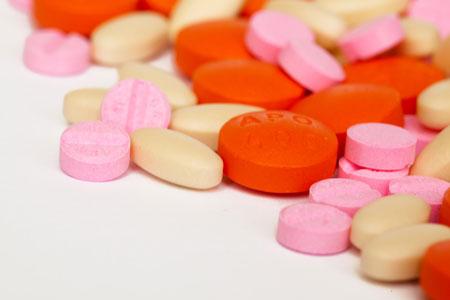
Poison Pills for Pets
Thursday, July 28, 2016
About one-quarter of all calls to the ASPCA Animal Poison Control Center (APCC) are about pets ingesting human medications. Many medications are used in both humans and animals but the dosages may differ. Some drugs safe for humans are extremely toxic for our pets. Pet poisonings due to human medications can include prescription drugs as well as over the counter medications.
Pets can easily ingest dropped pills or help themselves to pills on a nightstand that can result in illness or even death of the pet. Pets may raid the trash can or your purse. Store your purse out of the reach of pets.
The APCC reports these as the top 10 most common human medication calls received:
- Ibuprofen (Advil®, Motrin®) – many brands have a sweet outer coating that makes it appealing to pets, like an M&M but potentially deadly. Ibuprofen can cause stomach ulcers and kidney failure.
- Tramadol (Ultram®) – is a pain reliever. Your veterinarian may prescribe it but only at a dose that’s appropriate for your pet. Too much tramadol can cause sedation or agitation, wobbliness, disorientation, vomiting, tremors and possibly seizures.
- Alprazolam (Xanax®) – is an anti-anxiety medication or a sleep-aid. Pets that ingest it can become sleepy and wobbly. A few will become agitated instead. Large doses can drop a pet’s blood pressure and could lead to weakness or collapse.
- Adderall® – is a combination of four different amphetamines. It may be used to treat Attention Deficit Hyperactivity Disorder (ADHD) in children. In pets, this medication acts as a stimulant causing elevated heart rate and body temperature, hyperactivity, tremors and seizures.
- Zolpidem (Ambien®) – is a sleep-aid for people. It may make cats wobbly and sleepy. Most pets become very agitated and develop elevated heart rates.
- Clonazepam (Klonopin®) – is used as an anticonvulsant and anti-anxiety medication. When animals ingest it, the can become sleepy and wobbly. To0 much clonazepam can lower blood pressure, causing weakness or collapse.
- Acetaminophen (Tylenol®) – is very common in most households. Cats are extremely sensitive to acetaminophen but dogs can be affected too. The drug can cause liver damage. It can also damage your pet’s red blood cells making the cells unable to carry oxygen. Pets, like people, need oxygen to survive.
- Naproxen (Aleve®, Naprosyn®) – is an over-the-counter pain reliever. Dogs and cats are very sensitive to naproxen. Even small amounts can cause stomach ulcers and kidney failure.
- Duloxetine (Cymbalta®) – is an antidepressant and anti-anxiety agent. When ingested by pets it can cause agitation, vocalization, tremors and seizures.
- Venlafaxine (Effexor®) – is also an antidepressant. Cats love to eat the capsules. Ingestion can cause agitation, vocalization, tremors and seizures.
Medication that does one thing for people, does not do the same thing for pets. Any human medication could pose a risk to your pets in addition to the ones listed above.
Here are tips to help keep your pets safe from poison pills:
- Keep human medications away from pets
- Do not leave pills on the counter or any place a pet can reach
- Never leave loose pills in a plastic bag—these are easy to chew into. Make sure visiting house guests do the same
- Do not leave pill bottles within your pet’s reach; a dog can chew through a pill bottle in record time
- If you place your mediation in a weekly pill container, be sure it is stored in a cabinet out of reach of your pets
- If you drop any medication, pick it up immediately
- Never store your pet medications near your human medications—it is easy to mix them up if you are not paying close attention
- Contact your veterinarian if your pet ingests any medication that is not prescribed for the pet
- Keep the number for your veterinarian and the APCC handy in case of emergency
by Elisabeth J. Giedt, DVM
Veterinary Viewpoints is provided by the faculty of the OSU Veterinary Medical Hospital. Certified by the American Animal Hospital Association, the hospital is open to the public providing routine and specialized care for all species and 24-hour emergency care, 365 days a year.
